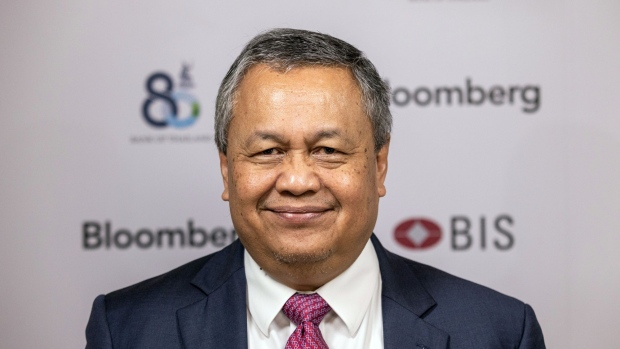Jan 26, 2023
As Bank Indonesia Governor Race Looms, Current Chief Touts Wins
, Bloomberg News

(Bloomberg) -- Bank Indonesia Governor Perry Warjiyo touted his credentials as a crisis-hardened central banker while the government prepares to select nominees for his successor over the next couple of months.
In an interview with Bloomberg Television’s Haslinda Amin on Thursday, Warjiyo, 63, spoke of his mettle navigating challenges since he joined Bank Indonesia nearly four decades ago. Most recent of which was during the pandemic, which drove Southeast Asia’s largest economy to its deepest slump in two decades and the rupiah to an all-time low.
“Age doesn’t matter,” said Warjiyo, who held the deputy governor and executive director posts at the central bank before he took on the top job almost five years ago. It is “knowledge, experience, especially during a crisis, that matters. I have given a lot of knowledge for the central bank. I’ve been living through a number of crises.”
Warjiyo hit the ground running as soon as he was appointed in May 2018, raising the key rate by 25 basis points barely a week into his five-year term to anchor the rupiah during an emerging market selloff. Back then, he pledged a “preemptive” monetary stance to quell volatility after a Federal Reserve rate hike.
It’s a line Warjiyo used again last year to kick off the current tightening cycle. After a swift succession of rate increases totaling 225 basis points — one of the most aggressive in Southeast Asia — inflation is set to return within the 2%-4% target band this year. The rupiah has become one of the region’s best performers, while the economy is on course for roughly 5% growth in 2023 and 2024.
Indonesia Signals End of Hikes as Fed Peak Rate Comes to View
“Look around the globe. Where can you find such promising economic prospects, stable fiscal and monetary policy, as well as opportunity for investments?” Warjiyo said on the sidelines of Bank Indonesia’s annual investment forum in Bali on Thursday.
The governor credited Indonesia’s post-pandemic turnaround to his close working relationship with Finance Minister Sri Mulyani Indrawati. The two embarked on an unprecedented “burden-sharing” arrangement, which allowed the central bank to finance about $74 billion in government debt and flushed the markets with cash to spur economic activity.
The move was seen as controversial during that time, but the duo was quick to assuage market concerns, assuring it would be a prudent and one-off intervention. The bond-buying program wrapped up last year, and the fiscal deficit has returned within the cap, ahead of the 2023 target.
“We’ve been working in the past three years, along with my dear friend the finance minister, in saving Indonesia from the Covid crisis. And we will be looking forward to saving the country also from the global turbulences under the strong leadership of President Joko Widodo,” he said.
Under Warjiyo’s watch, the parliament passed a law that expanded the central bank’s mandate and cemented its bond-buying authority.
Bank Indonesia’s next governor will be nominated and appointed by the president, with approval from lawmakers. Warjiyo is eligible for a second and last five-year term, under the law.
“The candidate of governors will come from the president,” said Warjiyo. He believes Widodo will choose the best person to lead Bank Indonesia.
--With assistance from Richard Lewis and Haslinda Amin.
©2023 Bloomberg L.P.





